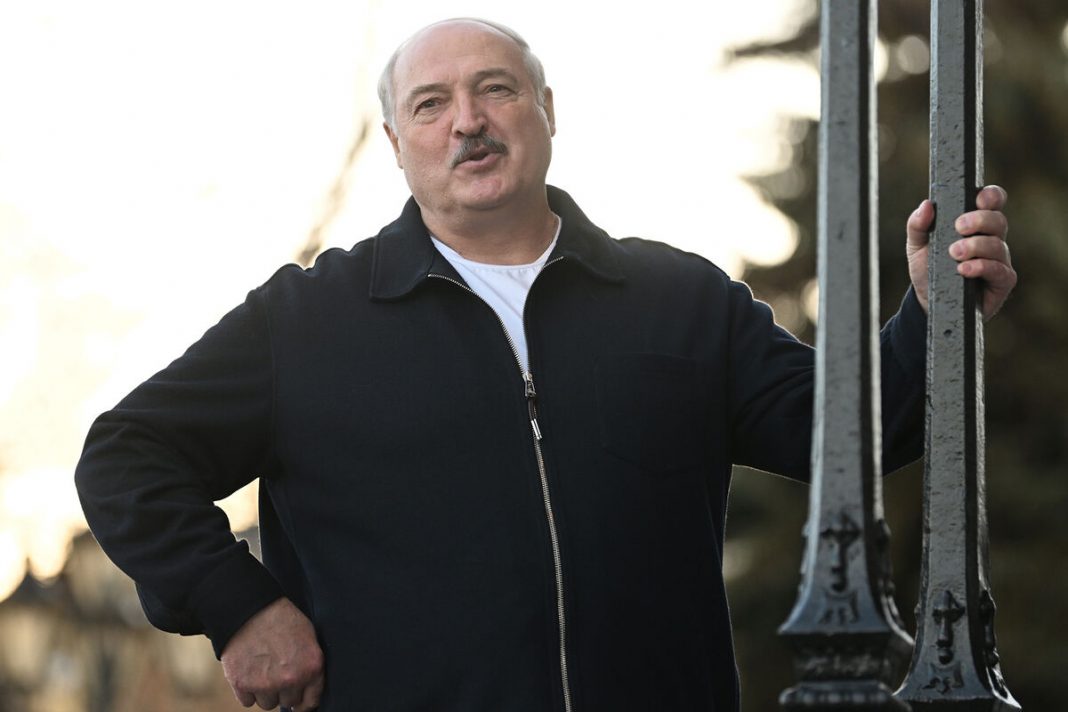The next presidential election should take place in Belarus as early as in 2025. According to the country’s constitution, the voting should take place no later than July. However, Ascolta sources say that the election may be postponed to an earlier date and held, for example, in February 2025.
In any case, it is important to realise that Alexander Lukashenko’s political system rests not only on friendship with his Russian colleague, but also on the stability of the positions of internal business clans and the main beneficiaries. Undoubtedly, this factor is one of the key and very indicative in the run-up to the elections. That is why Ascolta decided to study Alexander Lukashenko’s business environment in more detail and analyse their main assets.
This Content Is Only For Subscribers
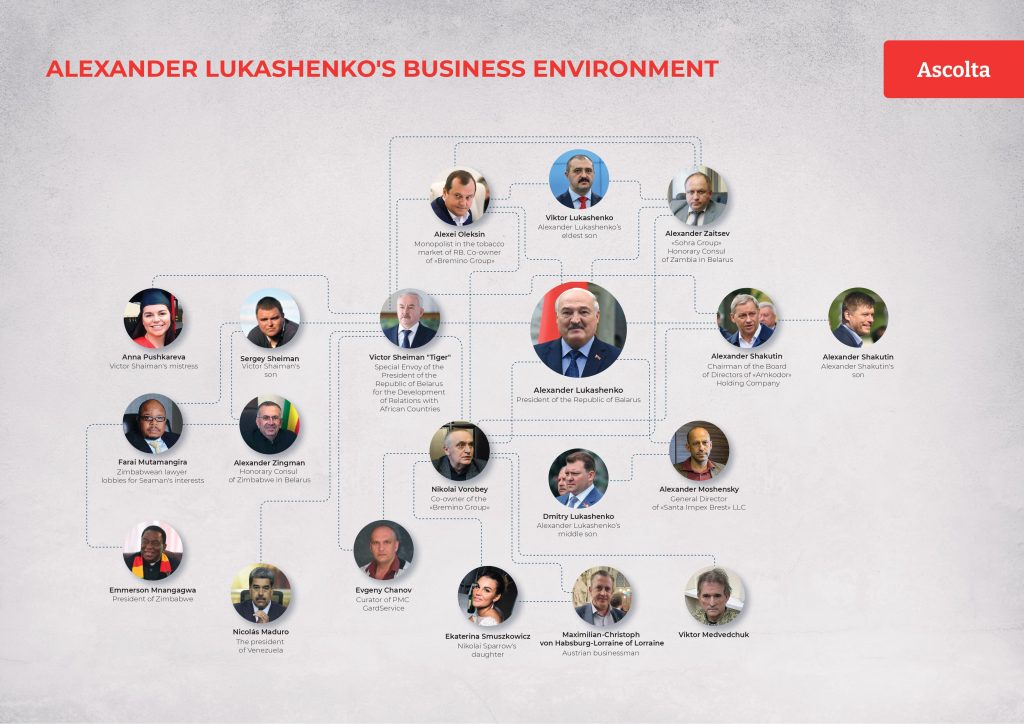
The central figure in the system of big Belarusian capital is Viktor Sheiman, the closest and most trusted associate of Alexander Lukashenko.
Viktor Vladimirovich Sheiman, nicknamed “Tiger”, was born on 26 May 1958 in the village of Soltanishki, Voronovsky district, Grodno region. He graduated from the Blagoveshchensk Higher Tank Command Red Banner School and the Academy of the Ministry of Internal Affairs of the Republic of Belarus, specialising in jurisprudence. He served in the Airborne Troops. He took part in combat operations in Afghanistan. At the time of his election in 1990 as a People’s Deputy of the Supreme Soviet of the BSSR of the XII convocation from Brest-South electoral district No. 105 of Brest region, he was a major, deputy commander of the airborne unit of the 38th Independent Guards Mobile Vienna Red Banner Airborne Brigade.
From 1990 to 1994, he was a deputy of the Supreme Soviet of the Republic of Belarus, secretary of the Supreme Soviet Commission on National Security, Defence and Crime Control. In 1994, he headed the election headquarters of presidential candidate Aliaksandr Lukashenka. Immediately after the election, on 5 August 1994, he was appointed State Secretary of the Security Council of the Republic of Belarus.
From 16 December 1995 to 27 November 2000 – State Secretary of the Security Council of the Republic of Belarus – Assistant to the President of the Republic of Belarus for National Security. From 28 November 2000 to 29 November 2004 – Prosecutor General of the Republic of Belarus. From 29 November 2004 to 4 January 2006 – Head of the Presidential Administration.
On 20 March 2006 he was appointed State Secretary of the Security Council of the Republic of Belarus.
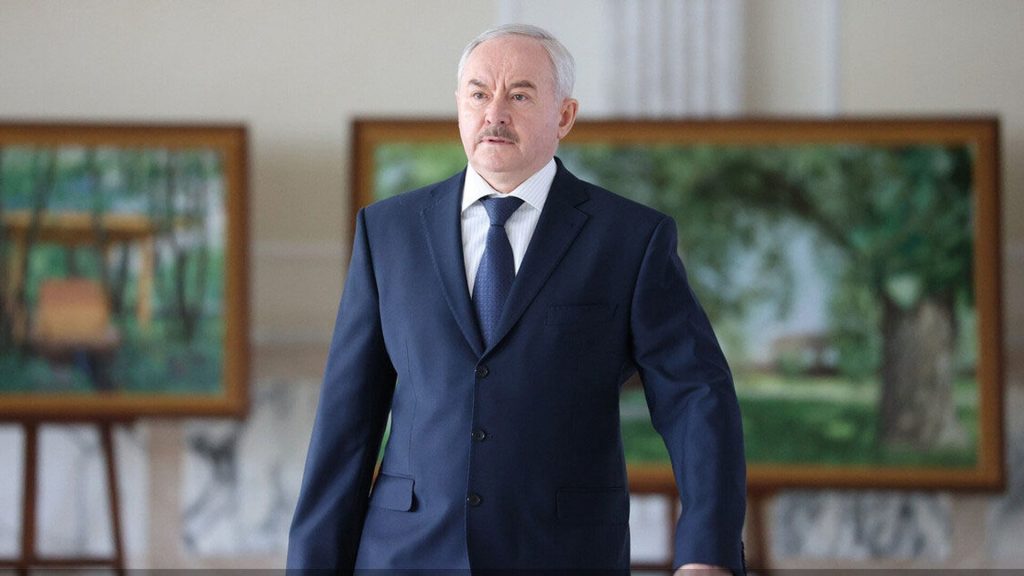
Co-chairman of the Belarusian-Venezuelan high-level joint commission. Considered a personal friend of Venezuelan President Nicolas Maduro.
On 8 July 2008, he fell into disgrace and was dismissed from his post because of the explosion in Minsk during the Independence Day celebrations. In January 2009 Viktar Sheiman was again appointed Assistant to the President of Belarus for Special Assignments.
On 21 January 2013, President of the Republic of Belarus Lukashenka appointed Viktor Sheiman as the Head of the Presidential Affairs of the Republic of Belarus by his decree.
Persons close to Sheiman own the company Globalcast, which in the mid-2010s was actively involved in the supply of sanctioned goods to Russia under the guise of Belarusian and neutral products, as well as in the grey re-export of flowers to Russia. The same people at different times also owned the first Belarusian private security company GardService. In 2021, BYPOL said that Sheiman was actively involved in the development of this PSC. Journalists who investigated his relationship with GardService suggested that this company could be engaged not only in performing services in Africa, but also be used as a military force inside the country in case of rebellion among Belarusian security forces or as a death squad.
In 2020-2023 he was in disgrace and practically did not communicate with Lukashenka, although he remained loyal and faithful. The reason was the actual inaction of people recommended by Sheiman for positions in the security forces during the attempt to overthrow Lukashenka in August-September 2020. Sheiman officially resigned on 11 June 2021, but Lukashenko brought him back a year and a half later. “There are no ex-generals, and there are no top officials either. Africa remains yours as a special envoy of the President,” Lukashenko said addressing Viktor Sheiman.
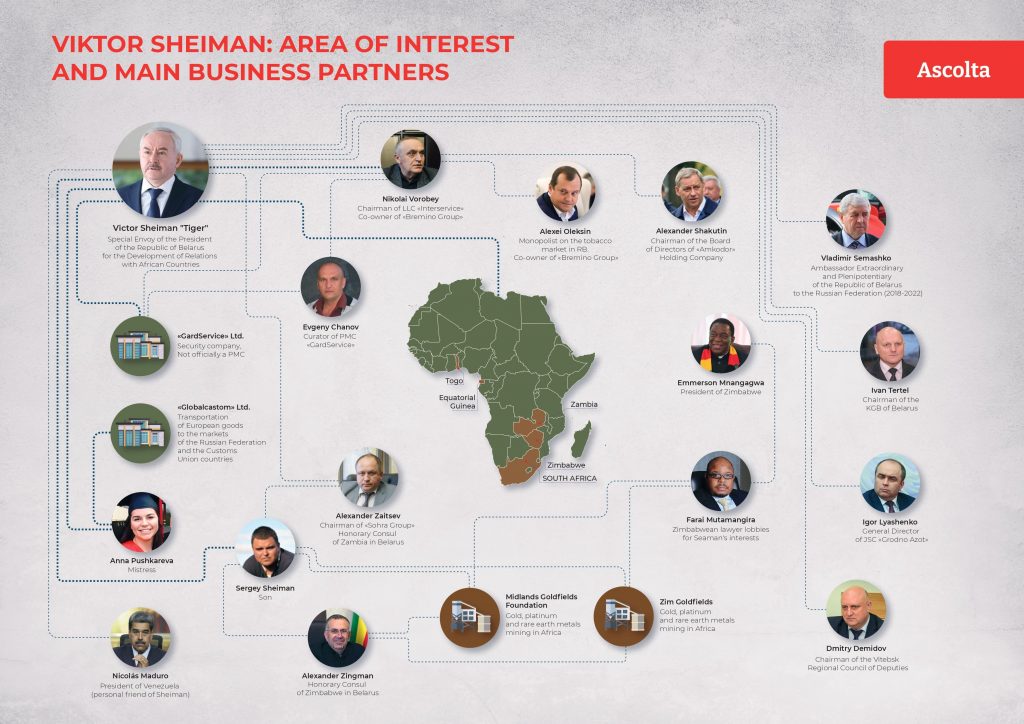
On 16 March 2023, President Aliaksandr Lukashenka authorised Viktor Sheiman, special envoy of the head of state, to supervise the development of cooperation with the countries of the African continent. Previously, Sheiman supervised this direction unofficially, having created reliable logistics routes between Minsk and a number of African states (Zimbabwe, South Africa, Zambia, Equatorial Guinea, Togo, and others).
Viktor Sheiman has long been interested in Africa. Back in 2018, he made a number of deals in Zimbabwe to explore for minerals: gold, platinum and rare earth metals. They began to be mined through Zim Goldfields, a Seychelles-registered company secretly owned by Sheiman’s son Sergei and “arms baron” Alexander Zingman. Another firm, Midlands Goldfields Foundation, with the same jurisdiction and the same founders. The intermediary in negotiations with the new Zimbabwean government (in November 2017, Zimbabwe experienced a coup d’état, which brought General Emmerson Mnangagwa to power) was lawyer and lobbyist Farai Mutamangira, previously close to the family of deposed President Robert Mugabe, and then moved to Mnangagwa’s camp. Mutamangira had common business interests with Alexander Zingman between 2014 and 2015.
In March 2018, Zingman was appointed Honorary Consul of Zimbabwe in Belarus. In the course of his business and consular activities, he has repeatedly met on working visits with the first persons of African states, in particular President Edgar Lungu of Zambia, President Filipe Nyusi of Mozambique, President Uhuru Kenyatta of Kenya, President Emmerson Mnangagwa of Zimbabwe and many others. In 2023, Zingman was present at the visits of Alexander Lukashenka to Zimbabwe (January) and Sergei Aleinik to Kenya (April), at the meeting of Zimbabwe’s First Lady Oxilia Mnangagwa with Aleinik during her visit to Minsk (April), at Aleinik’s visit to Equatorial Guinea (June), and at Lukashenka’s talks with Equatorial Guinea’s President Teodoro Obiang (September).
It was Zingman who undertook to supply equipment to Africa. At first they did it through the Hong Kong company Afex together with another Belarusian businessman Aliaksandr Shakutin (another businessman close to Lukashenka, owner of Amkodor LLC and Absolutbank CJSC). Then European banks refused to conduct transactions on the deals, and the company was formally sold to Farai Mutamangira.
Zingman is starting to trade in tech through his company Aftrade DMCC, which is registered in the United Arab Emirates.
In September 2019, Seaman flew to Zimbabwe for the third time, announcing the signing of a $350 million contract.
In 2021, opposition journalist Aliaksandr Iaraszkiewicz, supported by the Lithuanian centre Siena, the association of investigative journalists OCCRP and the Belsat TV channel, made a conclusion about the corruption component of Zingman’s activities: “The statistics on exports from Belarus to Zimbabwe are slightly different from the figures that were announced. Over the past five years – from 2016 to 2020 – Belarusian products worth $45 million were delivered there.
Yaroshevich also wrote: “As for gold, we tried to find out this information about the volume of its extraction, about the amounts earned, we applied to the Zimbabwean company ZMDC, which is a co-owner of the joint venture for the extraction of gold, we applied with this question to Alexander Zingman, we applied with this question to Sergei Sheiman, but no one answered us”.
On 25 June 2020, Zingman announced a $58 million deal between Belarus and Zimbabwe. On 30 September 2020, an official ceremony dedicated to the launch of the project to supply Belarusian agricultural machinery to Zimbabwe was held, attended by President of Zimbabwe Emmerson Mnangagwa and Minister of Industry of the Republic of Belarus Piotr Parkhomchik. Parkhomchik is Deputy Prime Minister and former Minister of Industry of the Republic of Belarus. There is at least one other story connected to Africa and Parhomchik. In 2022, he paid a visit to Togo, where he participated in the transfer of 22 buses for the Togolese Republic, which were produced under the SUB brand at the Zhodina plant ETON and delivered through Alexander Zingman’s Dubai-based company Aftrade DMCC, which we have already mentioned above. According to local publications, the transaction amounted to USD 2 million 276 thousand.
In addition to supplying machinery, Singman participated in the establishment of the Bison Agro Machinery service centre with training classes, which provides warranty and service support for Belarusian machinery, as well as training on the highest level of operation and repair of local specialists in various fields under the guidance of Belarusian specialists.
On 18 March 2021, Zingman was arrested by Democratic Republic of Congo police on arrival at Lubumbashi Airport, while Italian businessman Paolo Persico, Aftrade DMCC representative Oleg Vodchitz and Congolese businessman Moise Kapende were arrested at the same time. On 31 March 2021, Zingman and the other detainees were released without charge and Zingman returned to Zimbabwe.
Sheyman’s closest associate is billionaire businessman Nikolai Nikolayevich Vorobey. He was born in Ukraine (presumably in Zhytomyr Region) in 1963. Some sources refer to him as a relative of Viktor Medvedchuk. In 1985, he graduated from the History Department of the Shevchenko Kyiv State University. According to some sources, he worked in the state security agencies. According to other sources, he worked at a car service station in Navapolatsk. In some mass media he was called a native of “Naftan” (Navapolatsk oil refinery). Using close personal ties with the then director of Naftan Konstantin Chesnovitski, he became involved in schemes of supplying raw materials for the refinery and selling oil products. The only “survivor” after the arrest and conviction of the “mastodon of the Belarusian oil industry” Konstantin Chesnovitsky.
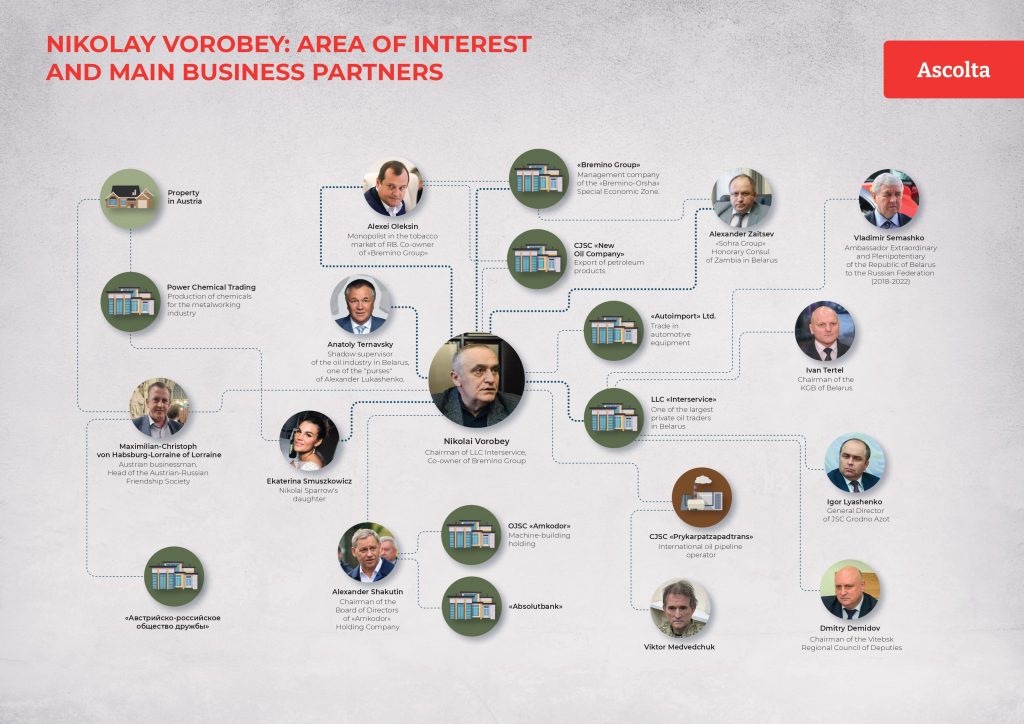
Vorobey appeared in business in 1994, right after Aliaksandr Lukashenka became president of Belarus. It was then that a company was registered, at the head of which Vorobey became – Autoimport Ltd. In the early 2010s, he became known as a co-owner of Interservice (together with Shakutin) – one of the largest private oil traders in the Republic of Belarus. Many believe that Vorobey is a front man, but in fact Vorobey’s business is Lukashenka’s personal business.
Main business – wholesale of oil products on the Belarusian market and their export (mainly to the EU and Ukraine). The main asset – Interservice LLC was registered in 1998; the main field of activity in 2016 was “wholesale of fuel oil”. In the early 2010s, the company was suspected of “grey” schemes for supplying Russian and Belarusian oil products to the EU. The company offered export diesel fuel TDE EN 590, bitumen mixture for road surfaces, various organic solvents, and residual tar product.
It was Vorobey who was the main inspirer of the “solvents-diluents” scheme successfully implemented in 2010-2012 and agreed with Lukashenka. It was duty-free re-export of light oil products from Russia. As a result of this scheme, only direct losses of the Russian budget at that time amounted to about $1.5 billion.
In 2010-2012, Belarus received Russian oil duty-free, but transferred duties on oil products exported to third countries to the Russian budget. In 2011, Belarus transferred just over $3 billion to the Russian budget in this way. However, some petroleum products were purchased in Russia and exported under the guise of chemical products (“complex organic solvents and thinners” and “lubricants”). Such “products” were not subject to customs duties. The main recipients of these goods abroad were companies controlled by Vorobyov from Latvia and Holland. In Latvia, these “solvents” were quickly turned into petroleum products. Then they were transited further to the Netherlands. In 2010-2012, about 5.6 million tonnes of light oil products worth more than $4.5 billion were exported from Russia in this way.
In 2019, the main activity of Interservice LLC on its official website was “trade in timber, sanitary equipment and construction materials”, but the company had two valid licences issued by the Belneftekhim concern for wholesale of oil products (including imported ones), issued in 2013; another licence was issued to the now defunct Oylinterservice JLLC, registered at the same address as Interservice.
In 2012, Interservice privatised the state-owned enterprise producing bitumen for road construction and other petroleum products Vyoska-Emulbit in Chervensk district, Minsk region, and renamed it Neftebitumny Zavod. The plant was originally bought by a Russian company for more than $30 million (Br265 billion), but abandoned the purchase after it turned out that the plant’s property was partially pledged. Following a new bidding process, Interservice paid $4.5 million for the plant. In 2012, Alexander Lukashenko gave Interservice the property of the closed Novopolotsk plant of protein and vitamin concentrates (built in the 1980s to produce feed additives for livestock), on the basis of which it was planned to build the third oil refinery in the country. Due to changes in the external environment, the project was postponed, but in 2019 the company was again tasked with repurposing the protein-vitamin concentrates plant. In 2019, Neftebitumenny Zavod bought a controlling stake in the Prikarpatzapadtrans oil product pipeline, which runs through Ukraine and is designed to pump light oil products from Russia to Ukraine and further west (the pipeline’s share in diesel fuel deliveries to Ukraine was estimated at 40%). Viktor Medvedchuk is a co-owner of this oil product pipeline. Earlier Vorobey tried to enter the Ukrainian power generation market by submitting documents for an auction to sell a stake in Centrenergo, but the bid was rejected. On 19 February 2021, the National Security and Defence Council of Ukraine decided to nationalise Prykarpatzapadtrans.
According to Ascolta data, Sparrow owns more than $3.5 billion in assets.

In the process of developing his business, Vorobey systematically enjoyed agreed favours and preferences from the state. He has always been the main participant in “grey” schemes of smuggled re-export and import. His company Interservice has been present on the oil products market for more than 20 years. The company is headed by Maxim Turov, the former commercial director of BelSlavneft of Russian billionaire Mikhail Gutseriev. Throughout this time, Interservice and its affiliated European structures have been re-exporting oil products from the Russian Federation with direct huge losses for the budgets of both Russia and Belarus.
After the settlement of the “solvents” scandal, by 2013 Lukashenka managed to agree that duties from the export of oil products would remain in the Belarusian budget in full. Immediately after that, businessmen Aleksei Oleksin, Anatoliy Ternavskiy and Nikolai Vorobei, as well as Deputy Prime Minister Uladzimir Semashko agreed with Lukashenka on a “new scheme” for re-export of oil products. Under Lukashenko’s secret decree, 70 per cent of the duty was simply stolen from the country’s budget. The state treasury “returned” the duty from the budget to the accounts of commercial structures of close oligarchs on a monthly basis.
The essence of the “new scheme”:
- “secret” coordination (Lukashenka’s decree) of the scheme of oil products supply from the Russian Federation (re-export) to the commercial structures controlled by Voroby’s group and persons close to him;
- supply of oil products to private and state-owned oil depots and enterprises (including OJSC Naftan) in the territory of the Republic of Belarus, payment of export duty to the budget of the Republic of Belarus;
- preparation of new documents according to pre-prepared technical specifications, “toll processing” of oil products into “fuel components” with subsequent export at minimum prices;
- realisation at world market value with foreign currency proceeds going to controlled offshore companies;
- return from the budget (from the accounts of the Ministry of Finance) of 70% of the duty to the accounts of controlled commercial structures.
According to preliminary data, at least 24 million tonnes of hydrocarbon products have been re-exported under the “new scheme” since 2013. The losses of the Belarusian budget alone are estimated at €2 billion 116 million. For many years, this scheme has resulted in colossal direct and indirect losses to the budgets of Belarus and Russia.
More than 3 million tonnes of oil products were re-exported annually. Diesel, fuel oil, vacuum gasoil, and petrol were purchased from Russian refineries, ostensibly for the needs of the “brotherly republic”. Naturally, they were supplied without paying Russian customs duties. Echelons arrived at Naftan or private bases (Novopolotsk, Vitebsk, Orsha, Tolochin, Barbarov, Rechitsa, etc.). The shipping documents were rewritten. The HS code and country of origin were changed. Cargo stood in deadlocks for a day. Sometimes it was not even drained. Then it was unhindered customs clearance by special Belarusian customs officers. The same tank wagons were sent to Ukraine, Lithuania and Latvia.
The “new scheme” allowed businessmen close to Lukashenka and their affiliated structures to receive colossal superprofits. The so-called “business” was built “on air”. Only under this “new scheme” the amount stolen from the country is tentatively estimated at $3.6 billion.
At the state level, the “new scheme” was covered by Uladzimir Semashko, Uladzimir Makei, Ivan Tertel (KGB), Ihor Lyashenka, Dzmitry Demidau.
In 2013, as a result of an additional issue of Interservice, Vorobey became the owner of a large stake in the machine-building holding Amkodor OJSC.
In 2013, Nikolay Vorobei and Alexander Zaitsev registered Bremino Group (later Aleksey Oleksin joined the two founders). In the late 2010s, Bremino Group started a project to create a large multimodal industrial and logistics complex in Orsha district of Vitebsk region – developing the territory of the former military airfield Bolbasovo and the adjacent territory. After Bremino Group started the implementation of this project, it received various incentives in 2018-2019. Presidential Decree No. 506 of 31 December 2018 “On the Development of Orsha District of Vitebsk Oblast” exempted the district’s enterprises from paying VAT on the import of technological equipment, reduced pension insurance contributions, the payment to the Social Security Fund, the amount of rent for land plots, and introduced a moratorium on random inspections. Presidential Decree No. 106 of 21 March 2019 “On the creation of the Bremino-Orsha Special Economic Zone” introduced a special legal regime for the complex of this company for 50 years. The residents were exempted from income tax on profits from the sale of goods, works, services in the SEZ for 9 years, from property tax for 20 years, from income tax, tax on dividends and equated income for 5 years from the date of declaration of profits, from VAT and customs duty on the import of various equipment and transport, and other benefits and preferences were granted. Economist Yaroslav Romanchuk compared the owners of Bremino Group who received benefits and preferences to “proto-oligarchs” who “turn into full-fledged oligarchs” with the support of the state.
In 2014, Interservice bought Absolutbank and was forced to disclose all ultimate beneficiaries (a mandatory requirement for Belarusian banks). At that time, half of the stake in Interservice was registered to Krasny Bor Hunting Farm with Voroby as the sole owner; as of 2019 Krasny Bor LLC already owns (according to information from the official website of Interservice LLC) 100% of the stake in Interservice LLC. As of 2016, Sparrow owned 99% of Krasny Bor, with his wife owning another 1%. The Krasny Bor hunting farm, located in the north of Vitebsk region, is considered one of the largest in the country. In 2016, a large batch of 56 red deer and 143 European fallow deer were purchased for the farm in Lithuania.
The companies of Mykola Voroby and Aleksey Oleksin are named in the media as the alleged founders of the New Oil Company CJSC, which was registered in 2020 and started its operations by exporting 1.2m tonnes of fuel oil produced by the state-owned Novopolotsk oil refinery (Naftan). Nikolai Vorobyov’s companies were also some of the forwarders of oil products in Ukraine. According to some reports, some of the old schemes still exist today, but illegally.
According to the Belarusian newspaper Ejednevnik, Voroby’s first company Avtoimport (registered at the same address as Interservice) owns real estate in Navapolatsk (a restaurant and a car park). “Interservice is also involved in the development of an elite neighbourhood near the Drozddy district in Minsk. For some time Interservice was engaged in milk processing (a small stake in Turovsky Dairy Plant).
In early 2013, together with Shakutin, he started sponsoring singer Alyona Lanskaya, who represented the Republic of Belarus at the Eurovision Song Contest in 2013. Alena Lanskaya (Alena Mikhailovna Lepokhina, born on 7.09.1085 in Mogilev) is reportedly Vorobey’s mistress. Vorobey was on the board of the Belarusian Tennis Federation, headed by Shakutin.
In late 2020, Sparrow tried to buy Ukraine’s BTA Bank, but the National Bank of Ukraine banned Sparrow from buying the bank.
In September 2022, Belarus Investigative Centre and Dossier stated that Voroby’s family owned assets in Austria, including flats in Vienna and a mountain chalet in Carinthia, and that his long-time partner was Maximilian-Christoph von Habsburg-Lorraine of Habsburg-Lorraine. The 300-square-metre residence in Carinthia is accompanied by a 19,000-square-metre plot of land with meadows, forests and gardens. The property belongs to Power Chemical Trading, owned by Nikolai Voroby’s daughter Catherine Smuszkowicz. She received the property from her father, and he inherited it from Maximilian-Christoph von Habsburg-Lorraine, a descendant of one of the branches (Lorraine) of the imperial family of Austria-Hungary. Maximilian of Habsburg-Lorraine worked at the Austrian banks Privatbank and Liechtensteine Landesbank (Österreich) AG, and now owns the elite Austrian wine company Weingut Habsburg and Habsburg Solutions, which offers various services to private companies and individuals, including property transactions. Since 2020, he has been running the “Austrian-Russian Friendship Society”, which mediates business contacts between businessmen from these countries. According to Austrian press reports, this society, and in particular its leadership, could be linked to one of Europe’s most wanted fraudsters, Jan Marsalek. Marsalek is a businessman who became known in Germany after his role in the high-profile Wirecard payment system scandal and as a potential possessor of the Novichok formula. According to the investigation of the Dossier Centre, Marsalek left Austria and went to Minsk, and the Russian security services issued him a passport under a new name at the border with Belarus.
Alexander Shakutin was Voroby’s closest companion and partner for a long time. But a few years ago they divided their assets. Now Voroby remains in charge of oil products trading (Interservice), the Petroleum Bitumen Plant, Absolutbank, and the Krasny Bor hunting farm.
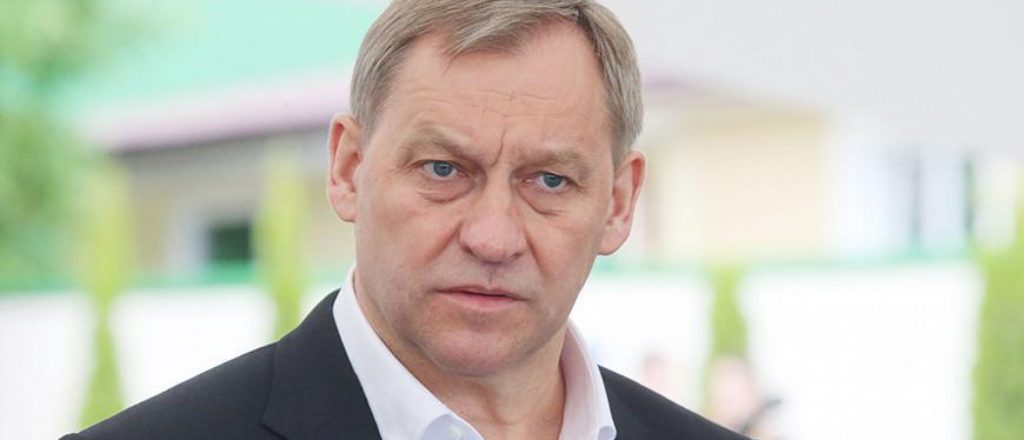
Alexander Vasilyevich Shakutin was born on 12 January 1959 in the village of Bolshoye Babino, Orsha district, Vitebsk region. In 1982 he graduated from the Belarusian State Medical Institute. He was a surgeon by speciality, worked in Minsk City Clinical Hospital and later in the medical unit of Minsk Tractor Plant. He entered business in the mid-90s. His first company was called Prommedinvest (it was engaged in trade in consumer goods (according to other information, Shakutin traded in medical equipment), then in machine-building products). He was President of the International Medical Association “Health and Beauty” (1997-1998), President of the Scientific and Production Association “Prommedinvest” (1998-2000), General Director of CJSC “Prommedinvest” (2000-2005), Deputy General Director of the International Medical Association “Health and Beauty” (1997-1998).In 2011 CJSC Prommedinvest was renamed into CJSC PMI GROUP, in 2013 CJSC PMI GROUP was reorganised by separating PMI Engineering LLC from it).
Shakutin’s first business partners are Igor Subbotin, deputy general director of MTZ for foreign economic affairs, and Yaroslav Buyalsky, a Komsomol colleague. In 2001-2002, Prommedinvest and a group of businessmen of Nepalese origin (Upendra Mahato and others) bought the former housing and road-building machinery plant Udarnik and all related assets, including a special design bureau. Most of the purchases were of numerous shares owned by the plant’s employees and other individuals. In the early 2010s, several state-owned enterprises were joined to Amkodor with the consent of Alexander Lukashenko for a low price (Minsk instrument-making plant BelVAR, Dzerzhinsk’s Agromash and Logoisk’s Epos were sold for $1.5 million). In 2017-2018, Amkodor had an opportunity to take a loan from China at 2% per annum under the guarantees of the Council of Ministers of the Republic of Belarus to build a new large plant in Minsk district, but after the construction started, it abandoned the plans and the loan agreement was cancelled.
In the early 2010s, Shakutin became involved in trading oil products; one of his business partners in this area is Nikolai Vorobey. In 2016, Shakutin stated that he had been friends with Vorobey for about 20 years. In 2014, the oil products trading company Interservice LLC, which they jointly owned, bought the Belarusian Absolutbank. In 2013, Amkodor made an additional issue of shares for $77 million, which Vorobey bought. Subsequently, it was reported about their division of the company: Vorobey got the trade in oil products (Petroleum Bitumen Plant in Chervensk district of Minsk voblast) and the bank, while Shakutin – machine building (Amkodor). Prior to the division of assets, Shakutin owned 50% of Interservice. In addition to Interservice, Shakutin has other assets in the sphere of oil products trading: the company Eximoil, 51% of which belonged to Spamash, was mentioned among possible participants in the “grey” export of oil products. Alexei Oleksin, a major oil products and cigarettes trader, who previously worked with Shakutin’s rival Yury Chizh, is believed to be linked to Shakutin.
Shakutin’s shareholding in Amkodor is not reliably known, but he is considered the majority owner of the entire holding. Previously, from 2001 to 2017-2019, Shakutin owned the second largest stake, but ran the company under an agreement with Nepalese businessmen. Shakutin also owns the diversified companies Spamash and PMI-group, the multifunctional centre Shanter Hill in Minsk and other assets.
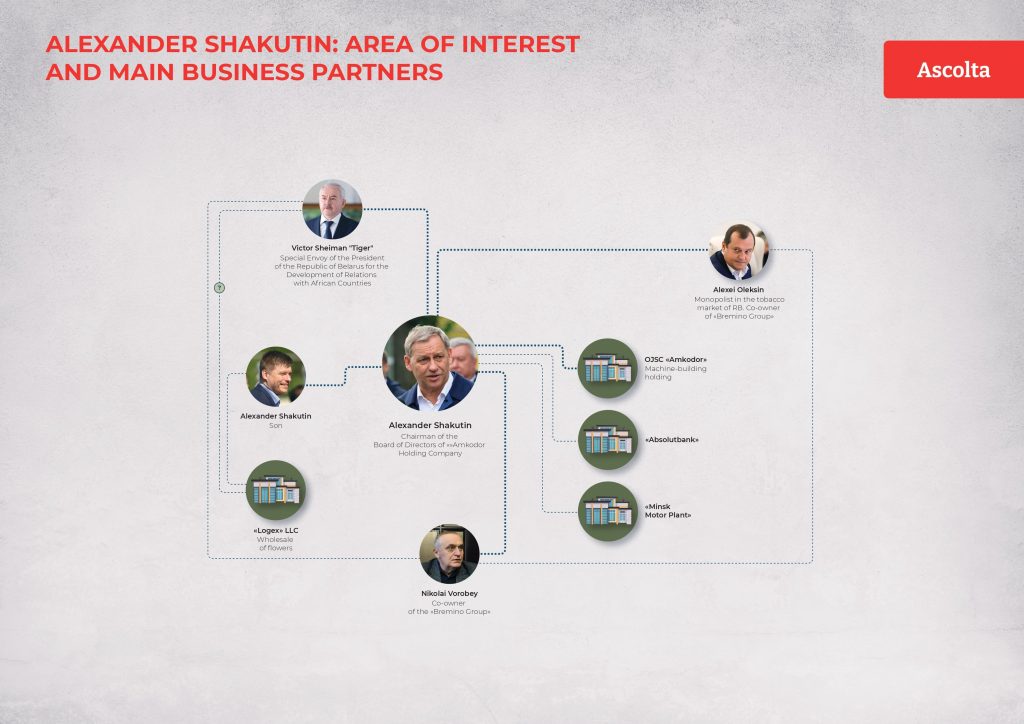
In 2011, Shakutin bought Dzerzhinsky Motor Repair Plant, which became the centre of Saleo Holding for the production of hydraulic products. Subsequently, Shakutin bought Kobrin-based OJSC Gidromash (“Saleo-Kobrin”) and Gomel-based Gidroprivod plant (“Saleo-Gomel”). In August 2020, Saleo Holding filed for bankruptcy for the purpose of financial rehabilitation. Saleo Holding was named after Alyona Lanskaya’s Eurovision song sponsored by Vorobey and Shakutin.
Alexander Shakutin and his son are named as co-owners of the company Logex, which exports and re-exports flowers to Russia, including using grey tax avoidance schemes. Interestingly, in Russia and in Europe, the flower business is linked to the families of the former head of Russian Railways Vladimir Yakunin and the current chief of the Foreign Intelligence Service Sergey Naryshkin. According to some experts, the flower business and banana trade are the two main covers for drug trafficking (disguised as fast-perishable goods). According to the investigations of several publications, Belarus is one of the main centres of transshipment of Colombian and Venezuelan cocaine. The main moderator of this process is Lukashenka’s right-hand man Viktor Sheiman, with whom Shakutin has a very close and trusting relationship.
Belarus has been the main supplier of fresh flowers to Russia for several years. Over the past five years, Belarus has increased the supply of cut flowers to Russia by more than a hundred times and has overtaken the world leaders in this field – the Netherlands, Ecuador and Colombia. While in 2015 Belarus exported 7 million pieces to Russia, in 2019 – 875 million pieces, according to data from Belstat. The Russian National Association of Floriculturists even cites data from the Ministry of Industry and Trade – more than 1 billion pieces. Now almost every second flower bought in Russia comes from Belarus.
The rapid growth of supplies from Belarus coincided with the restrictions imposed in Russia on imports of flowers from the Netherlands and Turkey in 2015-2016, but this is not the only reason for the boom of “Belarusian” flowers. The fact is that it is favourable to import flowers to Russia due to taxation peculiarities.
By Lukashenka’s decree, Belarusian re-exporters are exempted from paying VAT when importing goods from abroad, but when supplying flowers to Russia, where VAT must be paid, the cost of goods is greatly underestimated. If you study the statistics of Belstat on the supply of flowers, for example, it turns out that Belarus buys flowers at 32-36 cents per piece, which roughly corresponds to world prices, but sells them to Russia at 8-12 cents per piece. This scheme saves on taxes: one lorry can earn up to ten thousand dollars. As a result, Belarusian flowers are about 20-30% cheaper than those of competitors who supply them to Russia directly. Cut flowers from Ecuador for Russian wholesalers are obtained through the Belarusian Beltamozhservice and Globalkastom (the latter belongs to Viktor Sheiman’s mistress Anna Pushkareva, who gave birth to his son Mikhail in November 2018 in Israel).
At present, the legal entities connected with Globalcast are documented in the names of Yauhen Zhovner and Aliaksandr Romanouski. The latter is a business partner of Dzmitry Pobiarzhin, former press secretary of the Belarusian KGB. However, Globalcastom is still connected to Sheiman, and in the most obvious way. “Globalcastom Management” owns 75% in the mining company “Belgeopoisk”, while the remaining 25% is owned by the firm “Belzarubezhtorg” of the Presidential Administration. Globalkast customs clearance points are located in the industrial park “Velikiy Kamen”, trade and logistics centres “Beltamozhservice” and “Ozertso-logistic” of the Presidential Administration. Sheiman personally opened the Globalkast point in Veliky Kamen.
In February 2024, Nikkei Asia, with the support of Belpol, published a story about the purchase of Japanese and Taiwanese parts for Russian tanks, which is carried out through a company in China by a businessman close to Lukashenka. According to Belpol, this businessman is Aliaksandr Shakutin.
The third participant in the schemes of Sparrow and the “family” is Aleksei Oleksin.
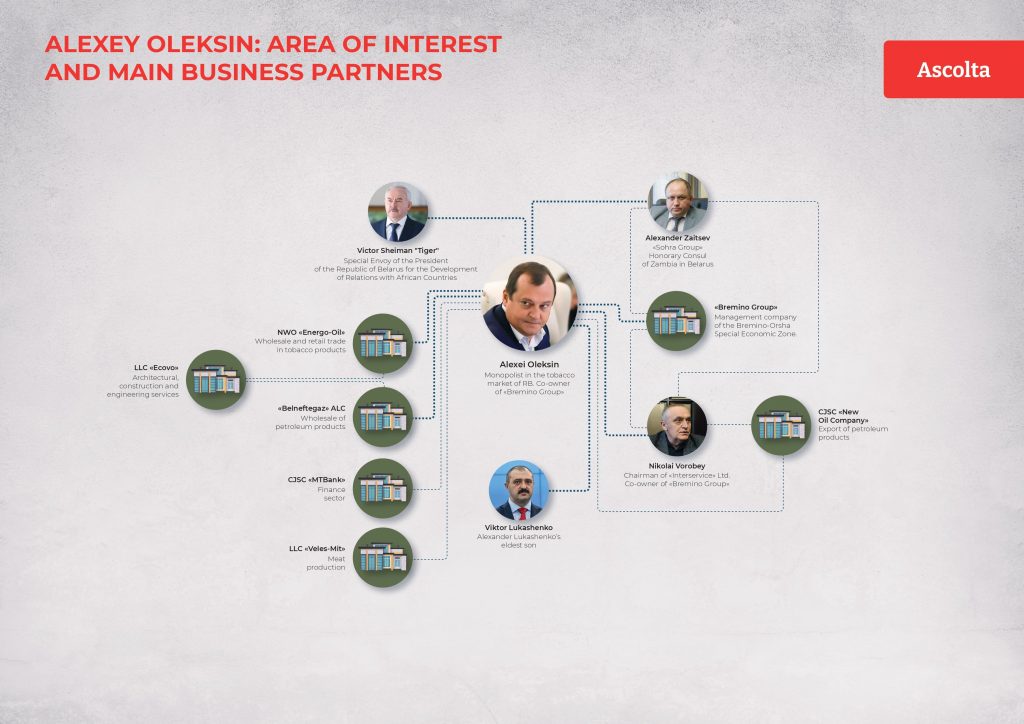
Details of Oleksin’s biography are unknown. He was born on 29 October 1966, presumably in Vitebsk or Novopolotsk. Graduated from Lomonosov Military Aviation Technical School in Leningrad region and Novosibirsk State Academy of Water Transport, specialising as a helicopter flight technician and economist-manager.
At one time, Oleksin was the chief specialist of the Department of Energy Resources and Oil Products of Belvneshtorginvest, which is part of the Presidential Property Management Directorate of the Republic of Belarus.
It is believed that Oleksin supervised the wholesale trade of petroleum products of Yuri Chizh’s Triple group of companies (according to other information, he worked in Chizh’s company). After the EU sanctions were imposed against Chizh, all his businesses that sold oil products in the EU were reissued to Oleksin (Energo Oil, Belneftegaz, Neonafta). In 2014, Oleksin bought the Triple-Veles plant (former Molodechno meat processing plant) from Chizh, renaming it Veles-Mit.
In 2013, he was briefly detained by the Investigative Committee of the Republic of Belarus in connection with the investigation of corruption in Belneftekhim.
He owns 60% of shares of SZAO Energo-Oil and ALC Belneftegaz (the remaining 40% of shares of these companies are owned by his wife). Through SZAO Energo-Oil and ODO Belneftegaz, he owns MTB Investments Holdings Limited, registered in Cyprus, which owns 98.97% of shares of Minsk Transit Bank (CJSC MTBank). As of 1 January 2019, the bank had assets of RUB 1.1 billion (about $550 million). Oleksin acquired the bank in spring 2015, having bought the shares from Belarusian (Zubr Capital) and American (Horizon Capital) investment companies.
Owned by LLC Veles-Mit (former Molodechno meat processing plant). Veles-Mit’s livestock development is financed by the state-owned Belagroprombank.
SZAO Energo-Oil and ALC Belneftegaz own controlling stakes in LLC Ekovo (100%; engaged in architectural, construction and engineering services) and OJSC Legavtotrans (73.358%).
Oleksin’s companies are believed to own the site of Minsk Kirov Machine-Tool Plant in the centre of Minsk, which is scheduled for demolition and development.
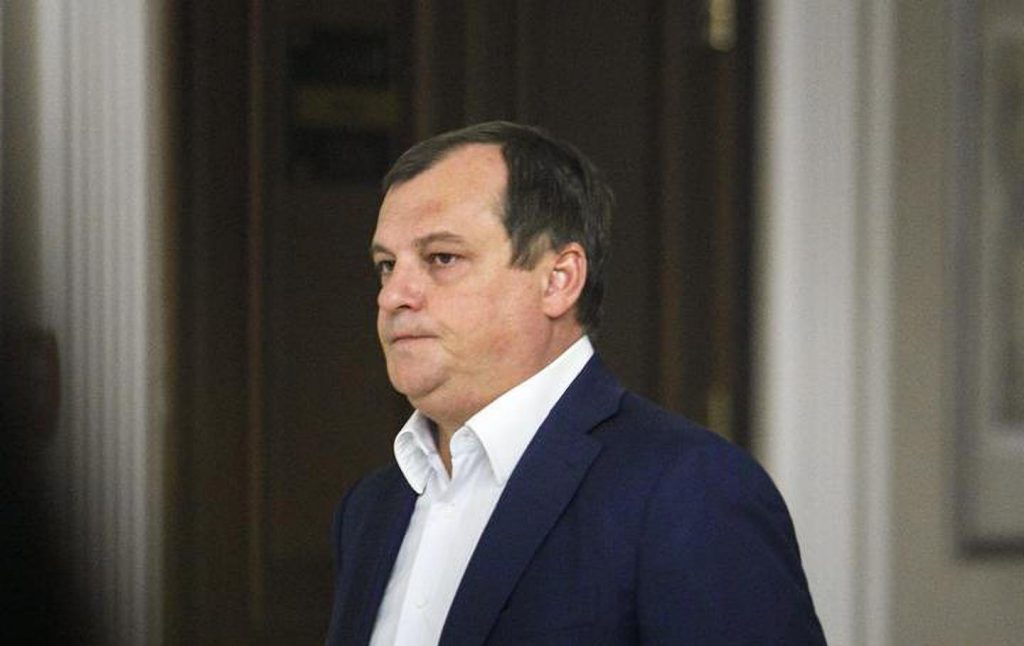
Together with Nikolai Voroby and Aliaksandr Zaitsev, he owns Bremino Group, a company that implements large infrastructure projects for international trade. It is believed that Bremino Group will be one of the main beneficiaries of the establishment by Alexander Lukashenko of a favourable tax regime in Orsha district of Vitsebsk region. Bremino Orsha, in fact, is a tax offshore, since the implementation of the active phase of its project in Orsha district coincided with the declaration of the district as a special economic zone. Economist Yaroslav Romanchuk characterised the Orsha project of Bremino Group as an “elite-nomenclature-power” closed business and suggested that in this way “proto-oligarchs turn into full-fledged oligarchs”.
Bremino Group is building a large logistics complex on the Russian border with road, railway and air terminals. It plans to create a flower exchange.
The companies of Aleksei Oleksin and Mikalai Vorobi are named in the media as the alleged founders of the New Oil Company CJSC, registered in 2020 and which started operations by exporting 1.2 million tonnes of fuel oil produced by the state-owned Novopolotsk Oil Refinery (Naftan). At the end of 2020, it was reported that Oleksin left the wholesale oil products business and concentrated on tobacco products.
According to the European Radio for Belarus investigation, Oleksin owns about a quarter of the IT company Synesis Group, which was included in the sanctions lists of the European Union and the UK on 17-18 December 2020 for aiding law enforcers. Oleksin’s Belneftegaz ALC owns 74.95 per cent of Synesis Stigma LLC, which the industry media include in the Synesis Group holding.
Oleksin also does business in Latvia: he is credited with owning the diversified company Mamas D and the Latgales Alus D brewery.
In January 2021, against the background of possible EU sanctions, Alexey Oleksin transferred his shares in the companies to his sons, Vitaly and Dmitry.
Now among Oleksin’s assets are Energo-Oil, MTBank (in December 2021 it was formally sold to Lebanese businessman Romeo Abdo, owner of a number of real estate properties and shopping centres in Minsk), hotel and restaurant complex Syabry, meat products plant Veles-Mit, national operator of the transit transport monitoring system Belneftegaz. The businessman helps Belarusian bikers, especially the main biker of the country – Lukashenko’s son Viktor. The latter in 2012, together with the son of the then Prosecutor General of Russia, Artem Chaika, created an elite motorbike club Iron Birds Chapter – an official division of Harley Owners Group – owners of Harley Davidson motorbikes. Iron Birds Chapter organises biker gatherings in Russia and Belarus, and is co-organised by Moto Event, a company owned by Russian Alexander Kitaev and Belarusian Dmitry Pavlovich. Pavlovich is the director of Energo-Oil and an employee of Oleksin.
Oleksin is so close to Lukashenka’s family that in March 2020 he was spotted by the telegram channel Nekhta on board a Gulfstream G550 business jet that was taking Viktor Lukashenka from Abu Dhabi to Minsk. The business jet had an Austrian registration: it was registered to Eolinus Beteiligungsverwaltungs GmbH, a company linked to Nikolai Voroby – Oleksin’s partner.
Through the company ENERGO-oil, Oleksin has created a whole network for the distribution of tobacco products. It covers both foreign and domestic markets.
To control cigarette production, ENERGO-OIL became the sole sales operator of the Neman tobacco factory in Hrodna. Having invested EUR 40 million in it, Olesin’s company equipped two production lines and built a new factory in Minsk.
Oleksin’s benefit in the tobacco industry is huge. The fact is that back in 2017, President Lukashenko ordered the creation of a “single distribution network” in the tobacco sector: this means that cigarettes from the country’s two tobacco factories began to be sold through Oleksin, and in 2020 he was given 40 per cent of the domestic market, according to the company’s website. It was with his company Energo-Oil that Oleksin’s company signed an investment agreement under which Oleksin’s company was leased state-owned Tabak stalls (some 900 sites) and given the right to set up its own Tabakerka stalls across the country. In 2020, Lukashenka changed the borders of Minsk for the sake of the businessman: for the development of tobacco production, 1.48 hectares of land in Shabany industrial zone were excluded from the capital and transferred to Minsk district.
In 2021, Lukashenko signed a decree “On the Activities of the Sports and Shooting Complex”, which regulated aspects of the complex of Energo-Oil, a company owned by the businessman.
Since the summer of 2018, Energo-Oil has been authorised to import and trade foreign cigarettes. Previously, cigarettes were imported into the country only by Belarustorg, a state-owned enterprise owned by the Presidential Administration. The company imported and now produces L&M, Parliament and Marlboro under licence, according to Inter Tobacco. Given that domestic production of tobacco products in Belarus is many times greater than domestic demand, imported cigarettes may also enter Russia – smuggled imported cigarettes from Belarus may also enter the Russian market through Belarustorg.
Oleksin also controls the production of disposable electronic cigarettes in Hrodna. It is believed that Oleksin has close informal ties with British American Tobacco.
It is Oleksin who controls the movement of all transit cargoes in Belarus. The fact is that “to counter smuggling”, Lukashenka ordered the creation of a transit transport monitoring system in Belarus, which tracks the movement of vans to their destination in real time. The vehicles are electronically sealed, connected to navigation systems and integrated with the customs database. The national operator of the system is Belneftegaz, a company controlled by Oleksin. The developer of this electronic system was a company also controlled by Oleksin. “Sinesis Stigma”, almost 75 per cent of which is owned by the same “Belneftegaz”.
The escort of cargoes across the territory of Belarus and abroad is provided by the security firm GardService (in fact, a private military company, also operating in some African countries and related to PMC Wagner) headed by Yevgeny Chanov, a former officer of the 5th Special Forces Brigade of the Belarusian Armed Forces, a graduate of the Ryazan Airborne School. At the same time he was the security director of Belgeopoisk LLC, a company that mines gold in Zimbabwe and other African countries. Chanov is Viktor Sheiman’s man. Thus, Oleksin and Sheiman have a close connection in business.
In December 2021, a journalistic investigation was conducted, which showed the connection of Oleksin’s structures with the Ukrainian energy market. It was at that time that it became known that David Arahamiya’s proxy firms imported electricity from Belarus, while purchasing it from Oleksin’s structures. People’s Deputy Yevgeni Shevchenko acted as an intermediary. According to some experts, the threads led to the chief of the Ukrainian Defence Ministry’s GUR, Kyrylo Budanov.
The competitors to these schemes were structures close to the head of the Presidential Office, Andriy Yermak, who “leaked” information through Serhiy Lyovochkin to the Strana website. At the same time, Shevchenko started to have big problems. Imports stopped for a while, but at the very end of 2021 they started again. But instead of the company Tet Group, which was associated with Arahamiya, the main importer became Tradeenergoresurs LLC. Its director became Nikolai Yurchak. He is the manager of businessman Artur Granets, co-owner of duty-free shops BDF, owner of BF Capital and Forbes Ukraine magazine, as well as Focus magazine. Grants became known to the general public after information about his affair with singer Svitlana Loboda surfaced.
Hrantz participated in the scheme with Belarusian electricity together with MP Ivanchuk (Dovira group). The latter acted with the permission of the head of the Presidential Office Andrei Yermak, who thus “motivated” Dovira to vote on important bills for the Bankova. The agreement with the Belarusian side was made through Aleksei Oleksin, who had known Granets and Ivanchuk for a long time and had common business interests with them (duty-free shops and tobacco business).
With the outbreak of war this business ceased. On 25 September 2023 Andrei Ivanchuk died suddenly. Arthur Granz now lives in Spain.
Another of the “pillars” of Aliaksandr Lukashenka’s business and the “custodian of Lukashenka’s foreign assets” is Aliaksandr Zaitsev, permanently residing in the United Arab Emirates. It is known that when Vladimir Putin came to Minsk in May 2024, Zaitsev’s plane, who flew to the same meeting, was met at the airport with almost presidential honours.
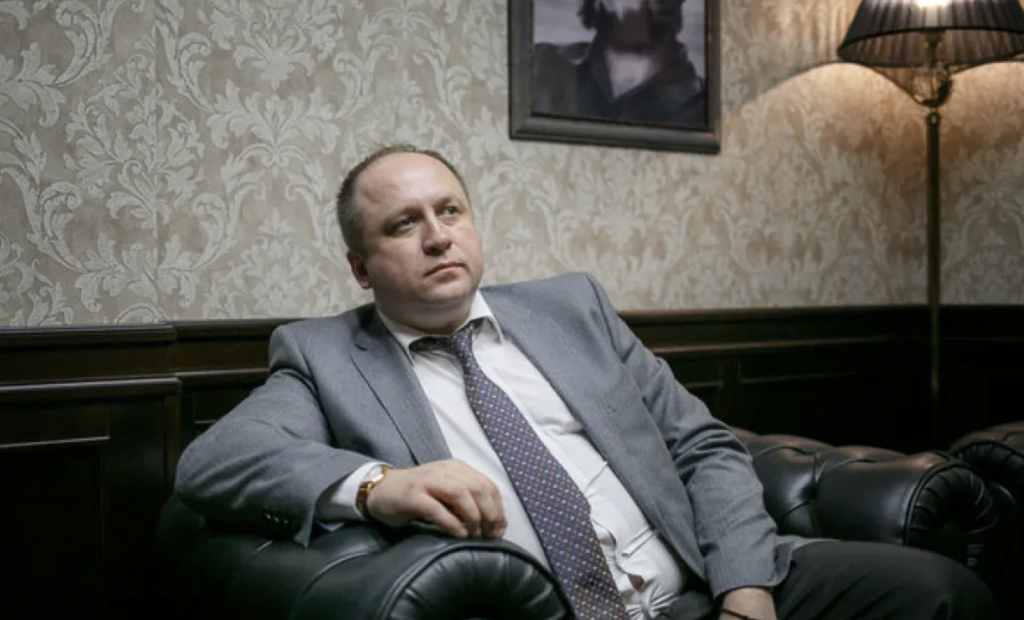
Alexander Zaitsev was born in 1976 in the village of Ruzhany, Brest region, in the family of a rocket officer. In 1993 he entered the Belarusian State University of Economics. At the same time he met Alexander Lukashenko’s son Viktor. Since then Zaitsev and Lukashenka Jr. have been close friends.
Worked in a number of commercial structures and independent mass media of Belarus in managerial and consulting positions. Since July 1998, he headed the group and later the sector of monitoring and information support of the management of the Ministry of Economy of the Republic of Belarus (NIEI of the Ministry of Economy of the Republic of Belarus, former Gosplan of the BSSR). From September 1999 and in the early 2000s he was Deputy Director of the Information and Resource Centre for European Integration Problems at the European Humanities University and worked on the problems of post-industrial economy at the Institute of Human Problems in Minsk.
For some time worked in the Council of Ministers of the Republic of Belarus. From 2004 to the end of the 2000s, he was an advisor to Prime Minister Sergei Sidorsky and was a member of the commission for certification of senior personnel. While working in the Council of Ministers, he met Sergei Rumas, who later became Prime Minister. He also worked as an assistant to Viktor Lukashenko, the eldest son of President Alexander Lukashenko. The Ejednevnik newspaper calls him a former employee of the Ministry of Foreign Affairs.
In 2018, in one of the few interviews, Zaitsev stated that he had been “a resident of the United Arab Emirates for about 10 years”, where his main business interests are centred. By 2013, he refers to the founding of Bremino Group together with Nikolay Vorobyov and Alexey Oleksin.
In 2016, Sohra Group – Zaitsev’s company registered in the UAE – received a controlling stake in football club Dinamo Brest.
Zaitsev is the Honorary Consul of Zambia in Belarus.
In 2002, Alexander Zaitsev married Olga Gromyko (writer, author of books in the fantasy genre), and in 2011 the spouses filed a fictitious divorce.
Project and Nexta investigators allege that Bremino Group has been involved in the supply of European products (“sanctioned”) to Russia in violation of the Russian embargo since 2014.
As of 2019, Zaitsev’s other assets included Sohra Overseas, a company that distributes machine-building products (mainly supplies Belarusian products to the Persian Gulf countries), companies that process and trade fertilisers (Rudensky Fertiliser Plant, EZ Fertiliser, OMU-Bel and others), quartz sand (Belgrit), real estate (Sohra Estate), and fish distribution in Russia’s Arkhangelsk. Together with Belspetsvneshtekhnika and a Latvian company, Zaitsev’s structures own the company BSVT-New Technologies, which develops and manufactures optical-electronic devices. One of Zaitsev’s Sohra Group subsidiaries, Sohra Mining, is engaged in exploration and is preparing to start commercial gold mining in Ghana and Sudan (concessions for deposits in Sudan were granted by President Omar al-Bashir).
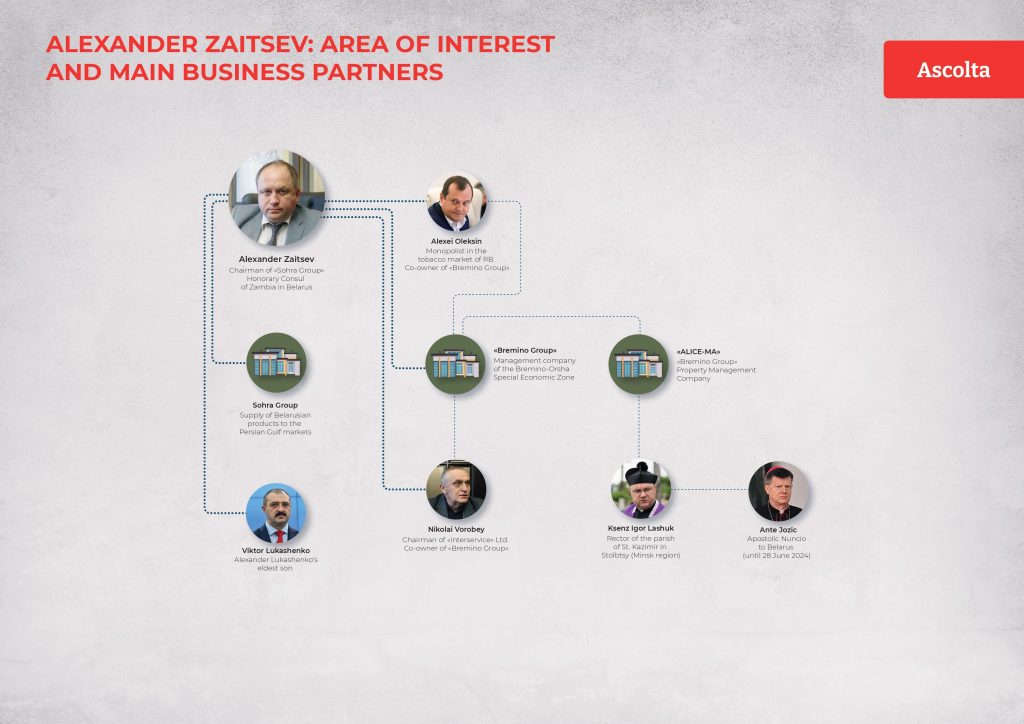
According to the journalistic investigation of the Belarusan Investigative Centre (BRC), after the imposition of the EU and US sanctions against Bremino Group, part of its property was assigned to the company ALIS MA, founded by the priest Igor Lashuk, who is close to the papal nuncio in Belarus, Archbishop Ante Jozic (it was after a dinner at Ante Jozic’s house that Belarusian Foreign Minister Uladzimir Makiej died suddenly in December 2022). Subsequently, Lashuk was present at the ceremony of awarding Zaitsev in December 2022 with the papal knighthood Order of St Gregory the Great for services to the church. Zaytsev classifies himself as a Roman Catholic Church loyalist.
According to the OCCRP investigation, Siena and Belsata, Oleksin and Zaitsev obtained residence permits in Lithuania in 2012 and opened several companies there. Although these companies operated without any noticeable business activity and without staff, more than 46 million euros passed through their accounts. According to the same investigators, citing data from Cyberpartisan, a few months after receiving tobacco preferences in 2018, Oleksin gave nine cars and motorbikes worth a total of $1.7 million to the presidential security service.
Finally, another active businessman close to Lukashenka is Alexander Moshenski, General Director of Santa Impex Brest (distribution, dealer network in Belarus, Russia, Ukraine and Moldova, a network of retail shops “Santa” in Belarus, restaurant business and transport services), founder of JV Santa Bremore – production of fish products (50% of the Belarusian and 25% of the Russian market of fish preserves), ice cream (brand YUKKI – the leader of the Belarusian market), soft drinks, since 2006. – 75% owner of Savushkin Product, one of the largest producers of dairy products in Belarus, which also includes Kamenets cheese factory and agricultural enterprise.
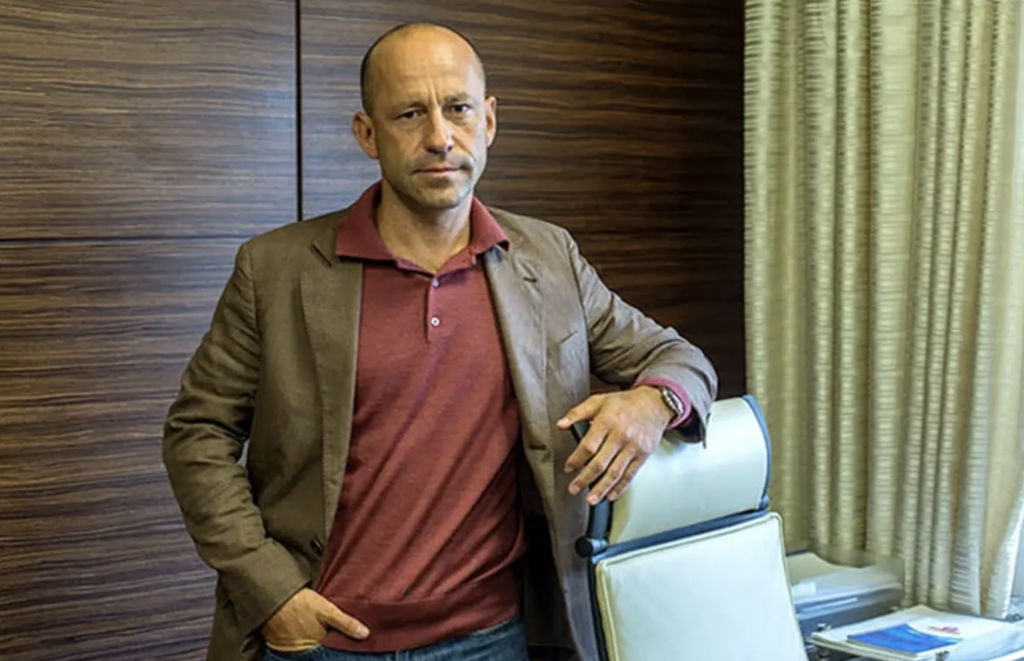
Moshenski was born on 15 March 1970 in Brest, graduated from the Belarusian State University in 1992. He worked at Nila (1992-93); from 1993 he was deputy general director of Santa Impex Brest, a joint venture founded by his father. In 2000 Mikhail Moshenski died and the company was headed by his son Aliaksandr.
According to official data, Alexander Moshenski controls the majority of shares in Santa Bremore: 50% directly and another 15% through the Belarusian firm Santa Service. The remaining 35% of shares belong to the German firm Bre Meer GmbH – the OCCRP found that it is also controlled by Alexander Moshenski through offshore companies.
From 2014 to 2018, Bre Meer GmbH was owned by Alpha Mar Foundation registered in the British Virgin Islands (BVI) – Moshensky was its beneficiary. This is confirmed by the documents of the Cypriot firm Alpha Mar Limited, which was controlled by a Seychelles company.
In 2018, Bre Meer GmbH was taken over by Santa International Foundation, which is registered in another offshore, the Island of Jersey. The BRC found out that the company is linked to Cyprus-based Newride Services Limited, which is owned by Alexander Moshensky’s daughter Yana.
The Santa Bremore company has been based in the Brest Free Economic Zone since its foundation and enjoys relevant state benefits: for example, it does not pay income tax if it sells its products for export.
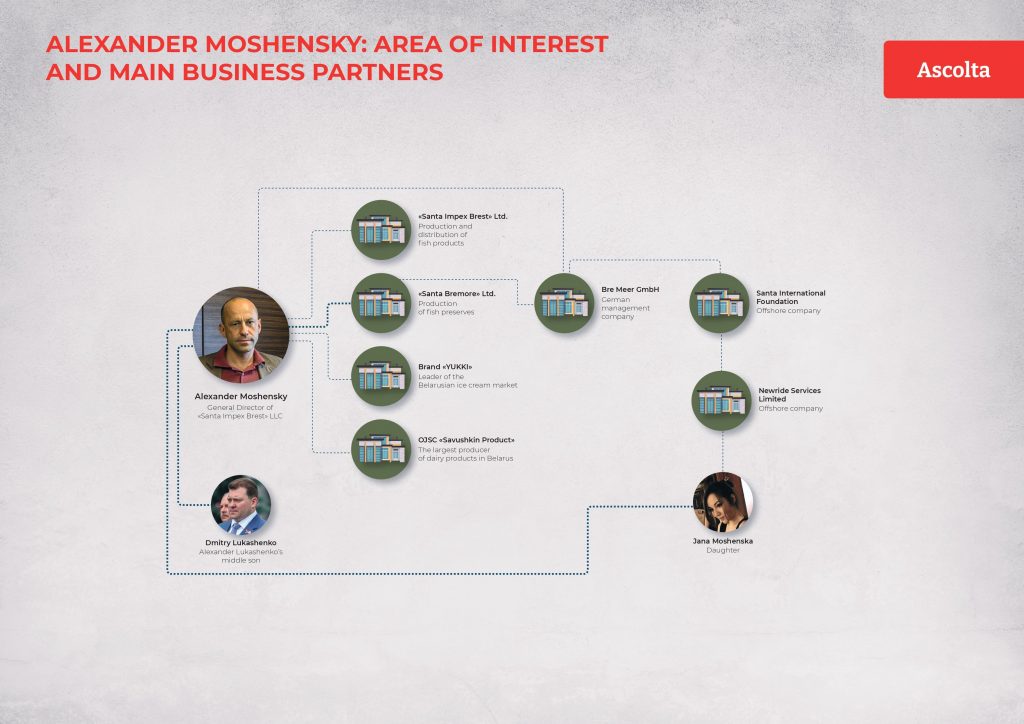
According to BRC calculations, thanks to this, “Santa Bremore” has saved almost 32 million dollars on taxes in the last three years alone. Santa Bremore imports fish from Norway, Iceland, South America and Asia through the port in Klaipeda. In 2016, Santa Bremore established a subsidiary company Santa Trade in Lithuania – it imports fish to Lithuania and then resells it to Belarus. According to company reports, Santa Trade employs only three people. Since its foundation, Santa Trade has been operating with negative capital, but it did not go bankrupt due to loans from the British firm – it was given loans by Moshenski’s offshore.
In 2016, Lithuania’s Santa Trade took out a loan from the UK’s Max Credit Investment Limited “to make urgent payments and meet working capital needs” – more than €28 million at two per cent per annum (the following year the loan rose to €38 million). Experts say this is well below market rates in the UK and EU.
According to Max Credit Investment Limited’s financial documents, in 2016 and 2017, its parent company was the Seychelles-based Alpha Mar Foundation. Even earlier, in 2014, Max Credit Investment Limited had loans of over USD 170 million from Alpha Mar Foundation (the beneficiary of the Seychelles firm at that time was Alexander Moshensky).
In 2020, Icelandic asset manager Carl Conradson became a beneficiary of Max Credit Investment – a BRC source claims that Conradson personally knows Moshenski. In 2022, Santa Trade repaid the loan to Max Credit Investment (about 3.6 million euros of interest accumulated over five years).
In 2010, Moshenski was Lukashenka’s proxy in the elections, and two and a half years later, the president awarded him the Order for Services to the Fatherland.
In the same year, on Lukashenko’s personal order, Savushkin Product acquired two state-owned plants: Baranovichi Dairy Plant and Berezovsky Cheese Factory.
BRC journalists established that in 2016, Moshenski accompanied Lukashenka on an official trip to Qatar and the UAE on a government Boeing 767. The businessman travelled twice in the company of Dzmitry Lukashenka and his family: from Istanbul to Minsk in March 2013 and from Minsk to Pisa in August 2019.
Moshenski is a member of the central council of the Presidential Sports Club – it is headed by Dzmitry Lukashenka. Although European Union sanctions were initially imposed against Moshenski, they were lifted in 2023 at the request of Iceland. In June 2023, during a PACE session, Icelandic MP Thorhildur Sunna Evarsdottir said regarding Moshenski: “I am ashamed of the information that Iceland used its diplomatic power in the European Union to remove him from the sanctions lists. I hope that soon we will become a state that shows full solidarity with the people of Belarus, regardless of whether it affects our economic interests in one way or another.” Moshenski has almost two decades of diplomatic and business relations with Iceland. In 2006, he even became the country’s honorary consul in Belarus. These ties could have saved him from European sanctions, found out the journalists from the publication Heimildin. According to their data, representatives of the Icelandic Foreign Ministry made more than 30 calls to the EU, lobbying Moshenski’s interests.

